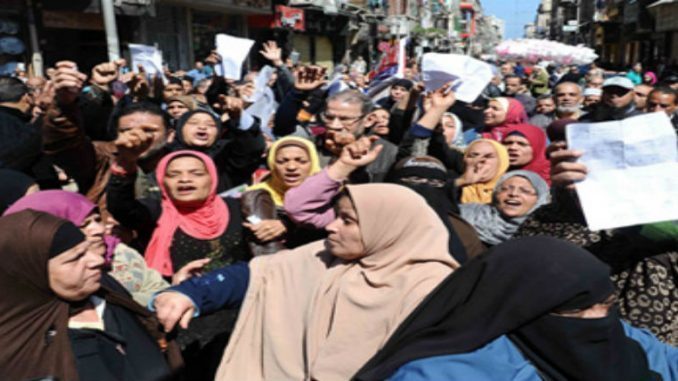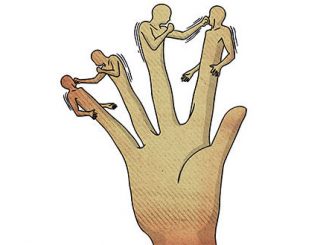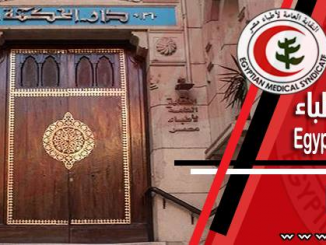
Hundreds of Egyptians took to the streets around the country blocking roads and surrounding government offices because they were unable to get their share of subsidized bread amid fears that the government was cutting food subsidies by the back door.
On Monday, protests began after changes to a bread subsidy scheme left some people without their regular ration. The unrest grew the next day as angry crowds gathered in the port city of Alexandria and several other cities across Egypt.
According to an anonymous official cited by reporters, the protests took place in the provinces of Kafr el-Sheikh, Minya, Assiut, with a small demonstration also taking place in Cairo.
Egyptians criticized the subsidized bread crisis on the social media.
On Twitter, hashtag Supply_Uprising became the top trending hashtag for Egypt as Egyptians posted pictures of confused people outside bakeries and in the street.
Ahmed Faraj, an Alexandria resident said,”We were surprised when the bakers refused to give us bread with the excuse that the Supply Ministry reduced their rations.”
Samia Darwish, a 50-year-old homemaker in Alexandria, said,”We are suffering from high prices. We have nothing left to live on but bread and now the government wants to deprive us of it.”
In fact, Egypt adopts a system in which each family receives a plastic card to buy five subsidized loaves a person per day. Then, the government pays bakeries a subsidy per loaf.
In addition, bakers also receive “gold cards” to sell bread to individuals without a smart card – for those waiting for cards.
On Monday, the Supply Ministry issued a statement denying it planned to cut bread subsidies after local media reported that rations would go from five to three loaves a day.
However, it did reduce the amount bakers can sell via the “gold card” scheme last week, according to a document seen by Reuters.
The Egyptian government move is likely aimed at reducing misuse of those cards, which cost the government hundreds of millions of pounds a year.
Last year, Reuters revealed flaws in the system allowing bakers to overstate sales to profit from the black market, where they sell subsidized flour to private bakeries at a profit, costing the government billions of pounds.
“The dangers are not lost on Abdel Fattah al-Sisi, in a country where economic discontent has helped unseat two presidents in five years,” said Reuters.
Al-Sisi has promised prosperity and stability after he launched a bloody military coup against Egypt’s first democratically elected president Mohamed Morsi.
However, Egypt’s military ruler failed to fulfill his promises as the country has been facing one of the harshest economic downfall in its history under his rule.
Tourism and foreign investments, which were the two major resources of hard currency, have withdrawn as a result of political unrest and security instability.
As a result, the Central Bank of Egypt (CBE) devalued the Egyptian currency in March.
The devaluation of the Egyptian pound and the shortage of foreign currency have flourished the black market on the currency expense.
In this context, Abdel Fattah al-Sisi has chosen to take the Egyptian people through the hard path by seeking to secure a loan from the International Monetary Fund(IMF).
In this context, Egypt’ s al-Sisi has worked to fulfill the IMF economic reform program to secure the loan.
Last November, the International Monetary Fund’s executive board has approved Egypt’s request to secure $12 billion loan facility after Egypt met its requirements.
On August 30 Egypt started its first steps towards the loan when Egypt’s parliament approved a long-awaited law introducing a value-added tax (VAT) of 13 %, rising to 14% in the next fiscal year.
On November 3, the Central Bank of Egypt floated the Egyptian pound and gave up trying to peg the currency to the US dollar allowing it to devalue by almost half.
On November 4, Egypt took another unprecedented decision, which has always been abandoned by former leaders in fear of public unrest, to cut subsidies for fuel leading to jump in prices, in addition to the introduction of the value-added tax to raise revenues.
Abdel Fattah al-Sisi has said before that he would not hesitate “for one second” to take the difficult steps necessary to ensure Egypt lives within its means.
In this context, last December Al-Sisi asked the Egyptian people to endure hardships and austerity for the next six months.
As a result of al-Sisi economic polices, Egypt’s core inflation has hiked above 30 % since the flotation of the country’s national currency last November.
It is worth to mention All Egypt’s presidents tend to avoid these economic measures of the IMF recalling poor Egyptians riot when President Anwar Sadat removed them on flour, rice, and oil in 1977, part of an effort to secure IMF-backed financing.
He reinstated later from the decision. Though Egypt has returned to the IMF virtually every decade since the 1970s, implementation of reforms has been mixed.
More recently, Egypt negotiated two IMF deals that were never finalized, including a $4.8 billion loan initially agreed in 2012.
During the bread protests,Gamal Ahmed, from Alexandria, said “We want the president to know that the poor are dying of the high prices.”
Accordingly, the head of the bakeries division at the Alexandria Chambers of Commerce, Abdel Aal Darwish called on the government to reverse the move and issue all Egyptians with cards.
Although protests drew small crowds and dispersed quickly, but it is the first major evidence of public anger over rising living costs.
In fact, bread subsidies are an explosive issue in Egypt, where over 70 million receive state rations.
In December, the Financial Times stated that Egypt’s rule is the worst under al-Sisi regime an article titled “Sisi’s Egypt: The march of the security state.” FT said that Egypt’s “social and economic problems are deeper than ever under the former general’s regime.”
In the same context, last August, the Economist highlighted al-Sisi as the one who is responsible for the ruining of Egypt in its editorial titled: The Ruining of Egypt…Repression and the incompetence of al-Sisi are stoking the second uprising.”
The magazine said at the end of its editorial that the demographic, economic and social pressures in Egypt are relentlessly increasing and that al-Sisi is incapable of providing the sustainable stability to Egypt, the political regime also needs to be reopened.
The magazine considered al-Sisi’s withdrawal from the political life is the hope gate for the Egypt. The Economist continued saying, “Egypt’s political system needs to be reopened. A good place to start would be for al-Sisi to announce that he will not stand again for election in 2018.”



